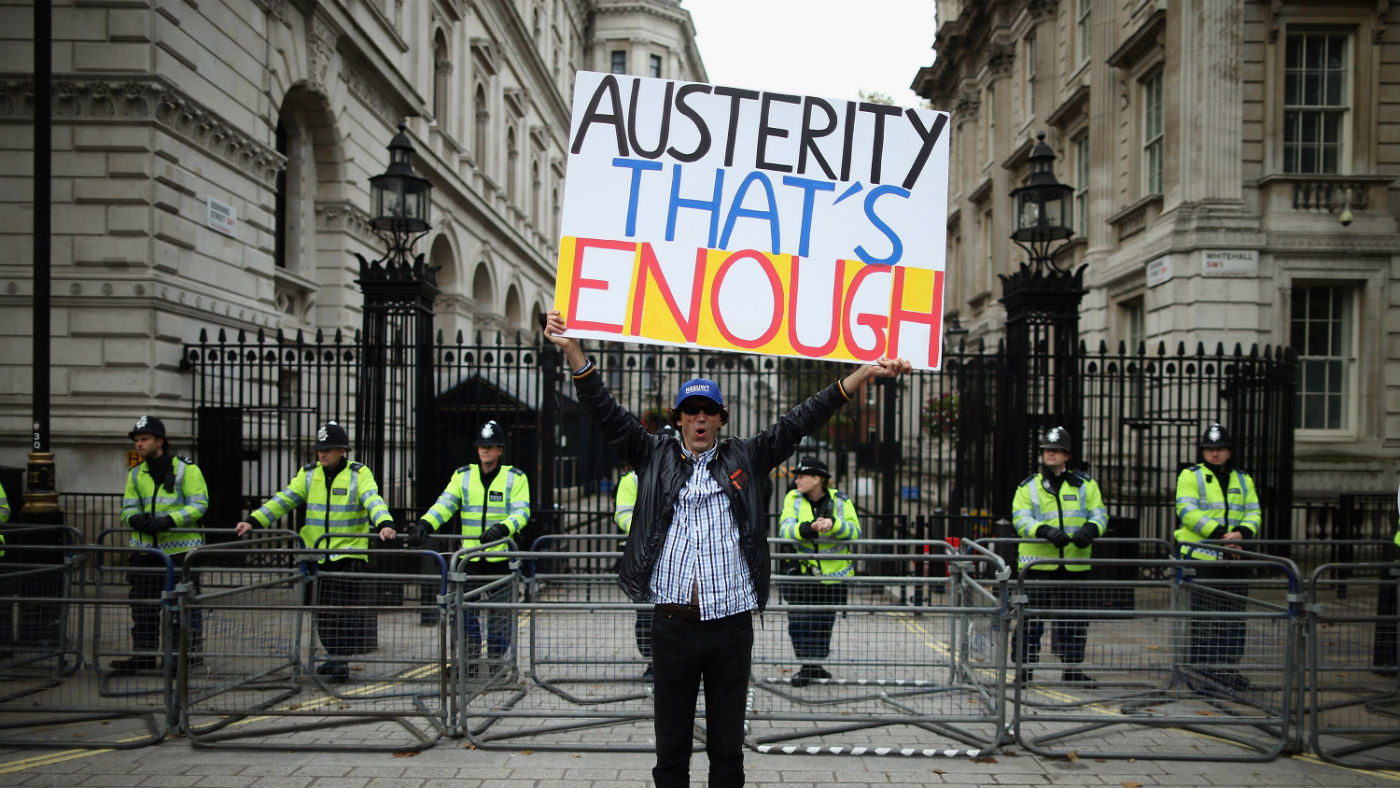Can anything stop the next global recession?
IMF warns emergency tool kit that pulled global economy out of 2008 financial crisis might not work a second time

A free daily email with the biggest news stories of the day – and the best features from TheWeek.com
You are now subscribed
Your newsletter sign-up was successful
Major financial institutions may be powerless to prevent the next global economic downturn from tuning into a full-blow recession, the International Monetary Fund has warned.
In a speech on the future of the eurozone, the IMF’s deputy director David Lipton, warned of the depleted power of central banks and governments to combat another sharp economic shock.
“The bottom line is this: the tools used to confront the global financial crisis may not be available or may not be as potent next time” he said.
The Week
Escape your echo chamber. Get the facts behind the news, plus analysis from multiple perspectives.

Sign up for The Week's Free Newsletters
From our morning news briefing to a weekly Good News Newsletter, get the best of The Week delivered directly to your inbox.
From our morning news briefing to a weekly Good News Newsletter, get the best of The Week delivered directly to your inbox.
A programme of quantative easing introduced by central banks in the wake of the 2008 financial crisis pumped huge amounts of cash into economies to offset the impact of the credit crunch and keep major financial institutions and businesses afloat.
However, the Daily Telegraph reports that “these efforts were so vast, and the recovery of economies so weak in the decade since the crisis, that central banks' balance sheets have swollen to a level that leaves little room left for manoeuvre”.
“Following various bailouts and slow recoveries many governments still have large debt piles, reducing the fiscal firepower available to counteract recessions” the paper adds.
Lipton warned there may also be “political resistance” to more bailouts because of accusations that the burden of the last recession fell unevenly on society.
A free daily email with the biggest news stories of the day – and the best features from TheWeek.com
The warning follows increasing concern the global economy is slowing down.
Weakening growth from China combined with a global trade war instigated by Donald Trump, sluggish eurozone growth and the fear of sudden economic shocks such as a no-deal Brexit have pushed investor confidence down.
Added to that is the fear that the US economy, still the world’s largest, is on the cusp of overheating.
Its current economic expansion will hit a decade in June of this year – matching the longest on record – and “while the economy could keep on growing, just the length of the current expansion means a recession or at least a slow down of the economy should appear sooner rather than later”, says Forbes.
Reuters reports that “concerns about the health of the world economy heightened last week after cautious remarks by the US Federal Reserve sent 10-year treasury yields to the lowest since early 2018”.
Historically, yield curve inversions have often preceded recessions, most recently in 2007 before the global financial crisis.
All this means that amid rising debt and a worldwide monetary tightening, “a mounting weight of evidence suggests the world is one shock away from a contractionary vortex that would be extremely hard to control”, says Ambrose Evans-Pritchard in the Daily Telegraph.
Elliott Goat is a freelance writer at The Week Digital. A winner of The Independent's Wyn Harness Award, he has been a journalist for over a decade with a focus on human rights, disinformation and elections. He is co-founder and director of Brussels-based investigative NGO Unhack Democracy, which works to support electoral integrity across Europe. A Winston Churchill Memorial Trust Fellow focusing on unions and the Future of Work, Elliott is a founding member of the RSA's Good Work Guild and a contributor to the International State Crime Initiative, an interdisciplinary forum for research, reportage and training on state violence and corruption.
-
 Switzerland could vote to cap its population
Switzerland could vote to cap its populationUnder the Radar Swiss People’s Party proposes referendum on radical anti-immigration measure to limit residents to 10 million
-
 Political cartoons for February 15
Political cartoons for February 15Cartoons Sunday's political cartoons include political ventriloquism, Europe in the middle, and more
-
 The broken water companies failing England and Wales
The broken water companies failing England and WalesExplainer With rising bills, deteriorating river health and a lack of investment, regulators face an uphill battle to stabilise the industry
-
 Epstein files topple law CEO, roil UK government
Epstein files topple law CEO, roil UK governmentSpeed Read Peter Mandelson, Britain’s former ambassador to the US, is caught up in the scandal
-
 Iran and US prepare to meet after skirmishes
Iran and US prepare to meet after skirmishesSpeed Read The incident comes amid heightened tensions in the Middle East
-
 Israel retrieves final hostage’s body from Gaza
Israel retrieves final hostage’s body from GazaSpeed Read The 24-year-old police officer was killed during the initial Hamas attack
-
 China’s Xi targets top general in growing purge
China’s Xi targets top general in growing purgeSpeed Read Zhang Youxia is being investigated over ‘grave violations’ of the law
-
 Panama and Canada are negotiating over a crucial copper mine
Panama and Canada are negotiating over a crucial copper mineIn the Spotlight Panama is set to make a final decision on the mine this summer
-
 Why Greenland’s natural resources are nearly impossible to mine
Why Greenland’s natural resources are nearly impossible to mineThe Explainer The country’s natural landscape makes the task extremely difficult
-
 Iran cuts internet as protests escalate
Iran cuts internet as protests escalateSpeed Reada Government buildings across the country have been set on fire
-
 US nabs ‘shadow’ tanker claimed by Russia
US nabs ‘shadow’ tanker claimed by RussiaSpeed Read The ship was one of two vessels seized by the US military